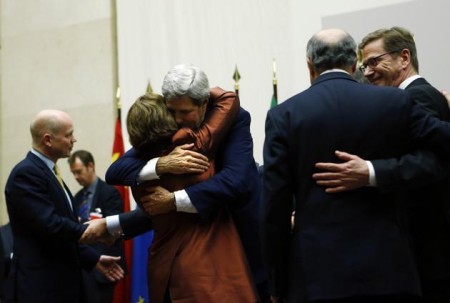The document of the interim nuclear agreement between Iran and the 5+1 Powers has been leaked by the Iranian news agency Fars (see separate EA entry). If the text is authentic, this deal is far bigger than even the most glowing news reports.
THE BASICS
Over the next six months, Iran will significantly limit its enrichment of uranium, putting it beyond any possibility of development for military use. It will also suspend work on the Arak heavy-water nuclear reactor and work with the International Atomic Energy Agency on tighter inspections.
In return, the 5+1 Powers have promised substantial easing of sanctions — much greater than the figure of “$4.5 billion” of unfrozen assets in Sunday’s reports — including restrictions that have sharply cut Iran’s oil exports.
Both sides have committed to seek the completion of a full nuclear deal within a year.
WHAT IRAN HAS AGREED
Iran will suspend its enrichment of uranium to 20% — civilian-grade but capable of development to 90%+ for a military program — and convert the existing stock to fuel plates or reduce it to 5%.
Iran will suspend development of the Arak heavy-water reactor, which was scheduled to come on-line in late 2014. To assuage concerns that it would use plutonium by-product from the reactor for a military program, it has agreed that it will not construct a reprocessing facility.
Iran will provide full information on its nuclear facilities to the International Atomic Energy Agency, including details on uranium mines and mills. It has agreed to more extensive inspections, including daily access by IAEA inspectors to the Natanz and Fordow enrichment plants.
Iran has accepted that there is no formal recognition of its right to enrich in the preamble of the agreement.
WHAT THE 5+1 POWERS HAVE AGREED
While not giving formal recognition of the right to enrich, the 5+1 Powers have implicitly accepted Iran’s enrichment through the details of the agreement.
The 5+1 Powers have agreed to unfreeze “an agreed amount of revenue held abroad” by Iran.
Perhaps more importantly, the 5+1 Powers have agreed to lift significant restrictions on Iran’s oil exports, namely “the EU and U.S. sanctions on
associated insurance and transportation services”.
The 5+1 Powers will remove bans on the transfer of gold and precious metals, imposed by the US in February. That effectively allows Iran’s customers to pay for goods — including oil and natural gas — with those resources.
The 5+1 Powers will lift sanctions on Iran’s petrochemical and automobile sectors.
The 5+1 Powers will remove restrictions on provision of spare parts for civilian aircraft.
The 5+1 Powers will “establish a financial channel to facilitate humanitarian trade for Iran’s domestic needs using
Iranian oil revenues held abroad”, including transactions
for food and agricultural products, medicine, medical devices, and medical expenses incurred abroad.
THE FINAL AGREEMENT
Within one year, both sides will implement provisions for an “enrichment programme with mutually agreed parameters consistent with practical needs, with agreed limits on scope and level of enrichment
activities, capacity, where it is carried out, and stocks of enriched uranium”.
Iran will ratify the Additional Protocols to the Non-Proliferation Treaty.
In return, all sanctions will be lifted.
“The Iranian nuclear programme will be treated in the same manner as that of any non-nuclear weapon state party to the NPT [Non-Proliferation Treaty].”

